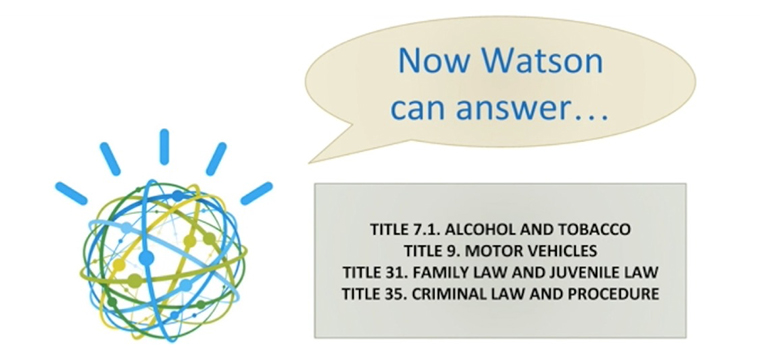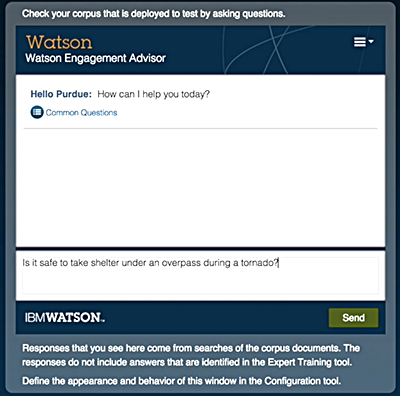
A computer program doesn’t have instinct nor does it understand human language. It can be trained through programming and testing, however, to recognize natural language and use it to find correct answers in very large datasets.
Students at Purdue were able to use a version of the famous IBM Watson software in Spring 2015 to learn firsthand about how computers process natural language. Their projects, which focused on retrieving information about security issues, performed well against IBM’s internal standards for success.
IBM Watson gained pop culture prominence in 2011 when it won an exhibition match against two Jeopardy! Champions. Since that time, it has used cognitive computing technologies to improve medical research, customer service, criminal investigations and more.
Universities across the country have begun offering courses in natural language computing and cognitive learning, such as Purdue’s Natural Language Technology, created and taught by Julia Taylor, assistant professor of computer and information technology. A limited number have been able to utilize the IBM Watson functionality along with the expertise of IBM mentors.
“We have smart students, creative students who like to see how things work and try new things,” Taylor said. “They basically ran with it. They ran with the questions, they were asking how to improve, what would happen if they “would press x”, if they remove this or that. The IBM mentors were very good at answering all of them.”
The four Purdue project teams scored very well in the areas important to IBM Watson: recall, accuracy and precision. For example, one team uploaded several portions of Indiana legal code dealing with specific topics. The team then trained the software by asking it many questions in conversational language. They let the software know when it returned accurate information and when it needed to return an answer that it rated with a lower level of reliability.
“They are creating this body of knowledge called a corpus, and all of these connections are being created,” Taylor said. “They asked it questions to train it, and sometimes they had to tell the computer, ‘I want you to trust me here’. When they are playing with the system, they are getting best practices on both sides. They learn what they need to do if something doesn’t work, and they learn how to work with natural language.”
Taylor attended the World of Watson event in May where she participated in discussions about University partnerships and where they are headed. In a nutshell, she told them students wanted more. IBM Watson has invited her to be a part of a team helping to define the next-generation course in natural language curricula using IBM Watson. Taylor is hoping to pilot this course once final approval comes from IBM.
Until then, Taylor already knows the topic area her students will be working on: medical research data. She has been approached by a doctor from a local hospital who would like quicker and more targeted access to medical research findings, especially when working on a complicated case. The doctor believes access to the information will help with making more informed medical care decisions.
 Such a project will also add another dimension to her students’ educations, Taylor said.
Such a project will also add another dimension to her students’ educations, Taylor said.
“We’ll be working with different expectations and different levels of knowledge,” she said. “We’ll be looking at information that we all value from totally different perspectives. How can we make this out-of-the-box system valuable to different segments of the population? There is a lot to explore.”
Taylor said the course has been a successful partnership with IBM because of the mentors who provided assistance. Armen Pishdotchian, a senior technical mentor, worked directly with Taylor and the students online, answering questions, showing how to fix some things in the student projects, and participating in one of the classes via telephone. Jeff Matteo was the official Purdue mentor and a Purdue alumnus from Krannert School of Management. He assisted with many issues as well.
